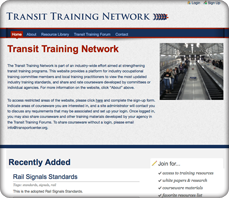News
Safety and Training were Major Topics in Panel Discussion
Posted June 2017
The 2017 APTA Rail Conference in Baltimore, Maryland, featured a unique workshop: Employees Are Our Greatest Asset: From the Shop Floor. Facilitated by Jack Clark of the Center and Madeline Janis, Executive Director of Jobs to Move America, the workshop consisted of a panel of four frontline workers who are active in their unions: Jerome Moore, SEPTA, TWU 234, Philadelphia, PA; Curtis Craft, IAM, Alstom, Hornell, NY; Vincent Loque, IBEW, Kinkisharyo, El Segundo, CA; and Douglas Schneider ATU 268, GCRTA, Cleveland, OH.
The discussion focused on employee and passenger safety particularly in the area of employee training and mentorship. All four panelists are actively engaged in joint labor-management safety programs and all agreed that the union’s role in protecting workers from retribution made a safety culture more likely. Loque and Schneider noted that their work places had capacity for workers to report safety problems anonymously. Craft spoke to the practice at Alstom where near-misses on safety were analyzed carefully towards ways in which to avoid future accidents. Moore spoke of the culture of safety at SEPTA. In attendance was Jeff Knueppel, SEPTA’s General Manager, who endorsed Moore’s statement and gave participants the background to the creation of the elevator-escalator apprenticeship program. Moore is a mentor in that program. Schneider is also a mentor in GCRTA’s joint apprenticeship program.
SEPTA and GCRTA are unusual in the transit industry for their strong commitment to training. For Alstom and Kinkisharyo, it is apparent that there are opportunities to enhance training. Both Craft and Loque addressed the need for structured apprenticeship in the industry where they work. Both also noted that the pressure for production and timely delivery of product are obstacles to carving out needed time for training and mentoring. Janis suggested that in future procurement for transit equipment, agencies should consider adding points for good training programs. GCRTA is getting ready for a major rail car procurement and Schneider agreed that better training will result in better rail cars being delivered.
Asked about what they would like managers to take away from the session, all four stressed that employers need to see training not simply as a cost but as an investment. In a final comment, Jack Clark from the Center noted that an investment in training can have high returns, noting that both Jerome and Jeff Knueppel spoke about the high quality of elevator-escalator work led to another transit agency and the City of Philadelphia contracting with SEPTA for maintenance of elevators and escalators. That training investment made maintenance a revenue center.

